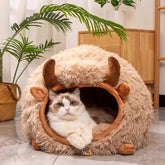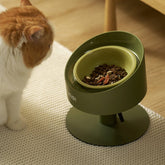Mastering Cat Litter Box Maintenance

As a cat owner, maintaining your cat's litter box is an essential task that you must carry out regularly. Keeping the litter box clean not only ensures that your cat stays healthy, but it also prevents unpleasant odors and the spread of diseases. In this article, we will discuss the various aspects of maintaining a cat litter box, including how often to clean it, when to replace the litter, and ways to make the task easy.
Why Is Litter Box Maintenance Important?
The litter box is where your cat does its business, and it is essential to keep it clean to prevent the buildup of waste material, bacteria, and odors. If left uncleaned for an extended period, the litter box can become a breeding ground for bacteria, leading to a host of health problems for both you and your cat. A dirty litter box can also be a source of unpleasant odors that can make your home less inviting. Moreover, if your cat's litter box is not adequately maintained, your cat may start to avoid using it. This can lead to inappropriate elimination behaviors, which can cause significant problems for you as a pet owner. Therefore, it is essential to keep your cat's litter box clean and comfortable to use.
Possible Issues with Unclean Cat Litter Boxes
When a cat's litter box is not cleaned regularly, it can cause a variety of issues for both the cat and their human companions. Here are some of the potential problems that can arise from an unclean litter box:
Health Issues for Cats
Cats are clean animals that like to groom themselves, and they may ingest litter or feces particles when they clean their paws or fur. If the litter box is not clean, it can harbor harmful bacteria and parasites, which can cause health issues for your cat. Some of the health problems that can arise from an unclean litter box include urinary tract infections, bladder stones, and digestive issues.
Unpleasant Odors
An unclean litter box can cause unpleasant odors that can make your home smell bad. The smell can also spread throughout your home, making it uncomfortable for you and your guests. If you have a small living space, like an apartment or a studio, the odor can be even more noticeable.
Attracting Pests
An unclean litter box can also attract pests, such as flies, ants, and rodents. These pests can be attracted to the feces and urine in the litter box, and they may infest your home if the litter box is not cleaned regularly. This can be particularly problematic if you live in an area with a high rodent population, as rodents can carry diseases that can be harmful to humans and pets.

Home Hygiene Issues
An unclean litter box can also create home hygiene issues. The feces and urine in the litter box can create a breeding ground for bacteria and germs, which can spread to other areas of your home. This can be particularly problematic if you have young children or people with weakened immune systems in your home.
Litter Box Aversion
If the litter box is not clean, your cat may develop litter box aversion, which is a condition where the cat refuses to use the litter box. This can lead to inappropriate elimination, where the cat may eliminate outside the litter box, which can be frustrating for the cat's owner. Litter box aversion can be particularly problematic if you live in a small living space, like an apartment or a studio, where there are limited areas for the cat to eliminate.
How Often Should You Clean The Litter Box?
The frequency at which you clean your cat's litter box depends on several factors, including the number of cats in your household, the type of litter you use, and your cat's individual habits. However, as a general rule, you should clean the litter box at least once a day. This means scooping out the solid waste and clumps of urine-soaked litter and disposing of them in a bag. If you have multiple cats, you may need to clean the litter box more frequently. It is also essential to clean the litter box thoroughly at least once a month, which involves emptying the litter box entirely, washing it with soap and water, and refilling it with fresh litter.
How Often Should You Replace The Litter?
The frequency at which you replace your cat's litter depends on the type of litter you use, how many cats you have, and your cat's habits. Clumping litter is the most common type of litter and is popular because it makes cleaning the litter box easier. However, it also means that the litter box will need to be emptied and refilled more frequently. As a general rule, you should replace your cat's litter entirely at least every month. If you notice any unpleasant odors or if the litter box looks particularly dirty, you may need to replace the litter more frequently. If you use non-clumping litter, you will need to replace the litter entirely more often, typically every 2-3 weeks.

Ways To Make Litter Box Maintenance Easy
Maintaining your cat's litter box need not be a chore. Here are some ways to make it easy and hassle-free.
Use A Litter Box Liner
Litter box liners are an excellent way to make cleaning the litter box easier. They are plastic bags that fit inside the litter box and make it easier to dispose of the used litter. When it's time to clean the litter box, simply remove the liner, dispose of it in a plastic bag, and replace it with a fresh liner. This will save you time and make cleaning the litter box more convenient.
Use A Litter Scoop
A litter scoop is a small plastic shovel that you can use to remove the solid waste and clumps of urine-soaked litter from the litter box. It makes cleaning the litter box quicker and more efficient. You can purchase litter scoops at your local pet store, and they come in a range of sizes and designs to suit your needs.
Use Odor Control Litter
Odor control litter is a great way to keep your litter box smelling fresh and clean for longer. This type of litter contains activated carbon, which absorbs odors, and it can help to keep the litter box smelling fresh between cleanings. If you are sensitive to strong odors, odor control litter may be a good choice for you.
Consider Automated Litter Boxes
Automated litter boxes are another way to make litter box maintenance easier. These litter boxes have a self-cleaning mechanism that automatically scoops out the solid waste and clumps of urine-soaked litter, leaving behind fresh, clean litter. Automated litter boxes can be expensive, but they can save you time and effort in the long run.
Helpful Tips For The Ideal Cat Litter Box
Different Cat Breeds
Different cat breeds may have different litter box needs. For example, long-haired cats may need a larger litter box to accommodate their size, while some breeds, like the Sphynx, may be more prone to litter box aversion. If you have a specific breed of cat, it's a good idea to research their litter box needs to ensure that you are providing them with a suitable environment.
Cat's Life Stages
Your cat's litter box needs may also change as they age. Kittens may require a smaller litter box that is easy for them to climb in and out of, while senior cats may need a litter box with lower sides to accommodate mobility issues. It's essential to monitor your cat's litter box habits as they age and make adjustments as necessary.

Conclusion
Maintaining your cat's litter box is an essential part of being a responsible pet owner. By keeping the litter box clean and comfortable, you can help to ensure that your cat stays healthy and happy. It's important to clean the litter box regularly, replace the litter as needed, and make the task as easy as possible with tools like litter box liners and litter scoops. By taking these steps, you can ensure that your cat has a clean and safe environment to do their business.























